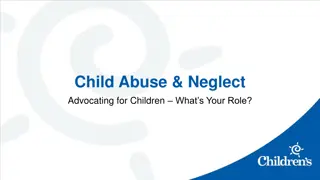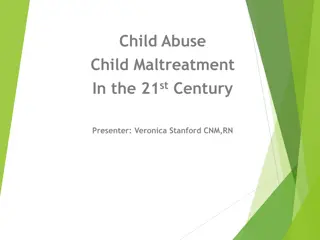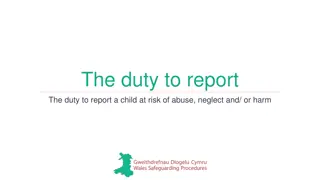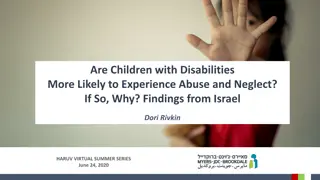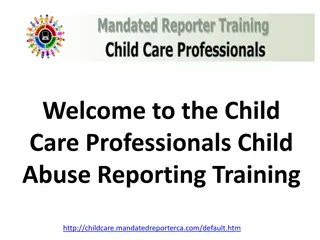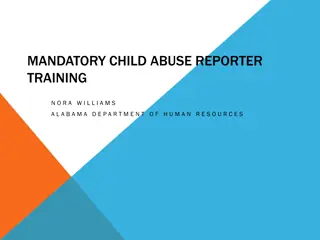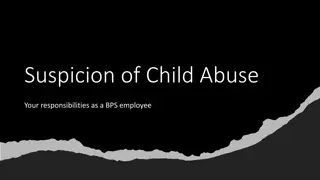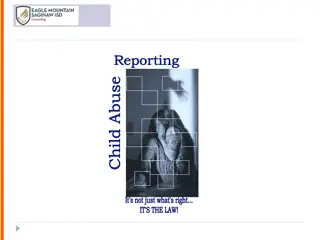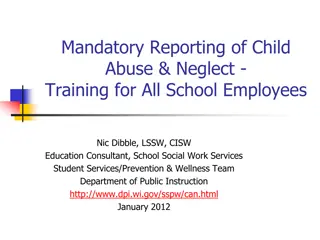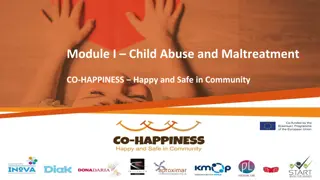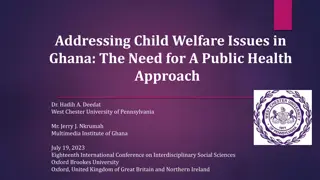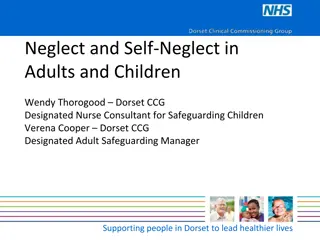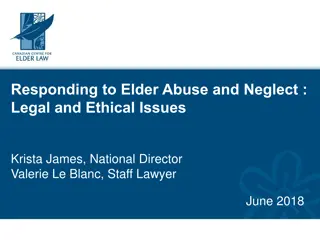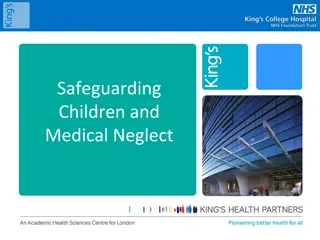Primary Prevention of Child Abuse and Neglect
The SEEK Study focuses on addressing social determinants of health and promoting children's well-being through primary prevention of child abuse and neglect. SEEK trains primary care professionals to identify and assist families in need, targeting psychosocial problems such as depression, parental stress, substance abuse, and more. The program includes tools like the SEEK Parent Questionnaire and aims to create a safe environment for every child.
Download Presentation

Please find below an Image/Link to download the presentation.
The content on the website is provided AS IS for your information and personal use only. It may not be sold, licensed, or shared on other websites without obtaining consent from the author.If you encounter any issues during the download, it is possible that the publisher has removed the file from their server.
You are allowed to download the files provided on this website for personal or commercial use, subject to the condition that they are used lawfully. All files are the property of their respective owners.
The content on the website is provided AS IS for your information and personal use only. It may not be sold, licensed, or shared on other websites without obtaining consent from the author.
E N D
Presentation Transcript
National Safe Environment for Every Kid (SEEK) Study National Safe Environment for Every Kid (SEEK) Study NJ AAP Chapter Webinar NJ AAP Chapter Webinar January January 2020 2020 Howard Dubowitz, MD, MS, FAAP Professor of Pediatrics
SEEK and Primary Prevention of Child Abuse and Neglect Address social determinants of health Support parents and parenting Strengthen families Promote children s health, development, safety Prevent child maltreatment (CM)
Primary Care: Primary Care: An Opportunity to Promote An Opportunity to Promote Children s Health, Development and Safety Children s Health, Development and Safety Well accepted, institutionalized Multiple visits (1st few yrs.) Goal of prevention Concern with child, family Special relationship with family No stigma An opportunity and a responsibility
The SEEK Model The SEEK Model SEEK trained primary care professionals (PCPs) SEEK Parent Questionnaire-R Brief assessment of identified problems Motivational Interviewing principles Initially help address problems PCP + behavioral health/SW/case manager/navigator Knowledge of community resources SEEK Parent Handouts - customized
Targeted Psychosocial Problems Targeted Psychosocial Problems Depression Major parental stress Substance abuse Intimate partner(domestic) violence Harsh punishment Food insecurity
SEEK Parent Questionnaire SEEK Parent Questionnaire - - R R Evidence-based Brief Easy to read Answer yes/no Convenient Voluntary Confidential Flexibility content, timing
SEEK PQ SEEK PQ- -R Intro R Intro Empathic: Being a parent is not always easy Universal: We re asking everyone Provide context: We want to help families have a safe environment for kids. Builds on what s accepted:injury prevention, safety Voluntary Confidential
How SEEK Works How SEEK Works At start of visit, parent given SEEK PQ-R Parent completes PQ-R while waiting Parent gives PQ-R to PCP Identified problems addressed by PCP + SW/case manager/navigator SEEK Parent Handout Referral to community agencies Follow up by child s or parent s PCP
Some of the Evidence Some of the Evidence
Two Randomized Controlled Trials Two Randomized Controlled Trials SEEK I Pediatric resident continuity clinic Inner city, low income 558 African American families SEEKII 18 private practices Suburban, middle income 1119 mostly white families
Hypothesis I Hypothesis I Training PCPs to address targeted problems will significantly improve their: Attitudes Knowledge Comfort level Perceived competence Practice Dubowitz et al, Pediatrics, 2011 Feigelman et al, Acad Peds, 2011
Summary of Findings Summary of Findings Improved PCP attitudes and behavior regarding the targeted problems, based on: Self-report Medical records Direct observation In SEEK I and II Sustained for up to 36 months
Study Hypothesis II Study Hypothesis II SEEKwill help prevent maltreatment, measured by: Parent self-report Medical record data Child protective services (CPS) reports Dubowitz et al, Pediatrics, 2009 Dubowitz et al, Acad. Peds, 2012
SEEK II: Conflict Tactics Scale: Parent-Child Minor Physical Assault 10 8 Incidents 6 SEEK (n = 595) Control (n = 524) 4 2 0 * P < .05 6 Months B = -0.08 12 Months B = -0.14* P values based on a mixed effects regression model, including random effects for family and practice, controlling for child s race, age, family income, mother s education and marital status. Std. Bs represent differences between SEEK and control in SD units.
compliance1 1 (SEEK I) Medical Neglect: Non Medical Neglect: Non- -compliance from chart review from chart review (SEEK I) Percent 10 9 8 7 6 SEEK Control 5 % 4 3 2 1 0 During* 1MD documented non-compliance * P < 0.05
Medical Neglect: Delayed Immunizations Medical Neglect: Delayed Immunizations1 1 from chart review from chart review (SEEK I) Percent (SEEK I) 10 9 8 7 6 SEEK Control 5 % 4 3 2 1 0 During* 1 MD documented * P = 0.002
Child Protective Services (CPS) Reports Child Protective Services (CPS) Reports for Abuse or Neglect for Abuse or Neglect (SEEK I) Percent (SEEK I) 25 20 15 SEEK Control % 10 5 0 During* * One-tailed t-test * P = 0.04
Time PCPs Spent on Psychosocial Issues Average time during SEEK II 80 70 60 Median Seconds 50 SEEK Control 40 30 20 10 0 During SEEK
Cost Analysis Cost Analysis SEEK: cost $210 per case prevented Compare to $14,520 ($1,993 $21,400) for medical & mental health for one physically abused or psychologically maltreated child SEEK is cost saving Lane WG, Frick K, Dubowitz H, et al American Public Health Association 139th Annual Meeting and Exposition. Washington, DC. Nov. 2011.
SEEK Studies: Summary of Findings SEEK Studies: Summary of Findings Pediatric primary care offers a good opportunity to address major psychosocial problems facing many children & families SEEK offers a practical model to improve primary care Evidence that SEEK can reduce child abuse & neglect and harsh parenting, and help promote children s health, development and safety SEEK appears cost saving SEEK does not significantly increase time addressing psychosocial problems Need for further evaluation
Recommended Paper Recommended Paper Sokol et al. Screening Children for Social Determinants of Health: A Systematic Review. Pediatrics. 2019;144(4):e20191622
The National SEEK Study The National SEEK Study 5-years, funded by NICHD Pediatric and family medicine primary care practices in the USA
Study Goals and Aims Study Goals and Aims Overall goals 1. To learn what facilitates or impedes SEEK s adoption, implementation, sustainability, and its effectiveness preventing child maltreatment (CM). 2. Improve primary care 3. Help develop the field of implementation science Specific aims 1. Compare two approaches to medical education (MOC 4/PI vs. Independent) 2. Examine SEEK in pediatric and family medicine primary care practices 3. Examine SEEK s effectiveness in preventing CM 4. Examine the economic costs of implementing SEEK
What Do Practices Receive for Participating in the Study? What Do Practices Receive for Participating in the Study? Improving your practice Needs assessment Training of PCPs: CME, MOC 2 and/or MOC 4/PI credits - for free Access to all SEEK materials Access to the social work staffed SEEK Helpline Helps you qualify as a Patient Centered Medical Home $2000/practice/year to help cover research related admin costs Possibly increased revenues CPT code 96161 Waiving of the license fee for implementing SEEK An opportunity to advance practice and knowledge of primary care
Participation of PCPs Involves: Participation of PCPs Involves: Four 30-minute online surveys - initially and after 8, 16 and 24 months Possibly, three 30-min. phone interviews initially, after 8 and 24 months Accepting randomization to one of two training approaches: Independent: 2-3 hours online SEEK videos MOC 4/PI: 2-3 hours online videos, three 1-hour webinars over a 2-month period, Quality Improvement (QI) project e.g. reviewing ~12 records x 3 Implementing SEEK Administer the PQ-R for selected checkups Briefly assess and initiallyhelp address targeted problems PCP + behavioral health professional/SW/case manager/navigator Using the SEEK Parent Handouts, or use similar handouts
Next Steps Next Steps If you re interested, please explore interest in the practice Let us know within ~10 days if you d like a webinar with your practice If not interested now, may we contact you re. possible future participation? If not interested at all, may we contact you re. limited participation in the study?
Thank You! Thank You! hdubowitz@som.umaryland.edu 410.706.6144


